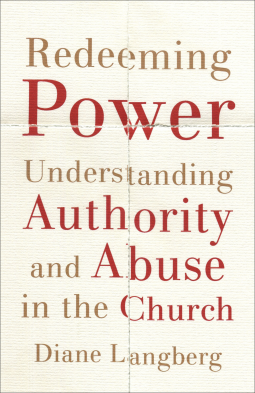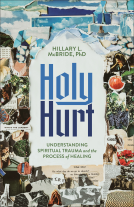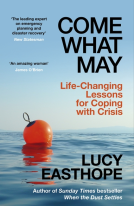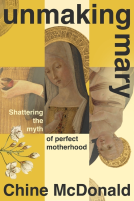
Redeeming Power
Understanding Authority and Abuse in the Church
by Diane Langberg
This title was previously available on NetGalley and is now archived.
Send NetGalley books directly to your Kindle or Kindle app
1
To read on a Kindle or Kindle app, please add kindle@netgalley.com as an approved email address to receive files in your Amazon account. Click here for step-by-step instructions.
2
Also find your Kindle email address within your Amazon account, and enter it here.
Pub Date 20 Oct 2020 | Archive Date 30 Oct 2020
Baker Academic & Brazos Press | Brazos Press
Talking about this book? Use #RedeemingPower #NetGalley. More hashtag tips!
Description
Although many Christians want to prevent abuse in their churches and organizations, they lack a deep and clear-eyed understanding of how power actually works. Internationally recognized psychologist Diane Langberg offers a clinical and theological framework for understanding how power operates, the effects of the abuse of power, and how power can be redeemed and restored to its proper God-given place in relationships and institutions. This book not only helps Christian leaders identify and resist abusive systems but also shows how they can use power to protect the vulnerable in their midst.
Advance Praise
“This book is one of the most important works for a pastor, or anyone in a position of authority, to dwell on. Langberg’s work laying out the relationship between power and abuse and contrasting it with how power is exercised in the person and work of Christ is foundational for any leader or ministry desiring to reflect the gospel. This book is a must-read for spiritual leaders and for every Christian as we seek to exhort each other to righteousness and use redemptively whatever authority we have in our own spheres.”—Rachael Denhollander, speaker, victim advocate, and attorney; author of What Is a Girl Worth?
“In this weighty and timely book, Dr. Langberg addresses a topic that too often goes ignored or even dismissed: power. As human beings, we have been given power and that power can be used to serve or to oppress. You will need to read this book with a highlighter and a box of tissues nearby. As a tender and experienced therapist, Langberg writes a book that painfully reveals even as it lovingly heals. Redeeming Power is essential reading for every leader and anyone who wishes to use what power they have to bless and heal in a world that so often curses and wounds.”—Jemar Tisby, New York Times bestselling author of The Color of Compromise
“Redeeming Power should be on the must-read list of every pastor, leader, boss, coach, parent, and educator—anyone interested in learning how to use power to bless, not curse. No stodgy academic language here—she is a woman on fire, and in a manner worthy of the prophets before her, she delivers a call for justice on behalf of those deeply wounded by power wielded in ungodly ways. This book is packed with biblical truths, insight, wisdom, conviction, and instruction for those who have eyes to see and ears to hear. I believe what she has written could change the world if properly applied, because it is straight from the heart of our compassionate God.”—Kay Warren, co-founder, Saddleback Church
“Vintage Diane Langberg! Bold. Challenging. Christ-exalting. Langberg is a strong advocate and voice for the vulnerable and voiceless.”—Tim Clinton, president, American Association of Christian Counselors
“With the clear-eyed assessment of Jeremiah and the courage of Esther, Diane Langberg looks leaders square in the eye and tells the unflinching truth about power. This is difficult truth that every leader needs to know but most work hard to avoid. Be assured that the author’s love for God and his people will lead you down the potentially painful path to where mercy and hope await. How can an author weave together the pain of abuse with the promise of properly leveraged power? Langberg shows you in Redeeming Power. Her relentless pursuit of protecting the powerless is supported by her decades of listening for God’s voice amid victims’ pain, as well as that of the perpetrators, some of whom don’t realize the damage their words and actions produce. May we listen carefully to this prophetic admonition. Langberg’s voice needs to be heard by all of us. For all who hunger for healing and yearn to know how power can be both abused and properly used, this book is for you.”—Robert L. Briggs, president and CEO, American Bible Society
“With immeasurable insight and grace, Dr. Diane Langberg’s Redeeming Power exhorts people, institutions, and nations to wake up, repent, and seek the kingdom of God by looking critically at the imbalances and injustices we have allowed to flourish. If there was ever a time we needed to receive this challenging, life-saving word, it’s now. Thank God for choosing Diane to profess it!”—Jeanne L. Allert, founder and executive director, The Samaritan Women
“This book broke my heart, instructed my soul, and pointed me to the most powerful King-Servant-Healer, who lovingly humbled himself to overcome evil with good. This is an anointed book, reflecting theological sensitivity and egregious life experiences, calling us to steward and reclaim power for its original purpose: human flourishing.”—Ronald A. Matthews, president, Eastern University
“Every now and then you come across a resource that you passionately want to recommend to others because you know its contents are that essential and valuable. Redeeming Power is one of those resources. Diane Langberg helps us see and understand the truths we so often miss, ignore, or explain away because they are shrouded in much deception of self and others. Redeeming Power is a ray of light streaming through systems and hearts darkened by the abuse of authority. Those who read will discover truths that can reveal, free, and heal. Her words honor the voices of victims who have too often been silenced, calling us all away from exploitation and corruption toward compassion and righteousness—toward Jesus himself.”—Wade Mullen, assistant professor and director of the MDiv program, Capital Seminary & Graduate School; author of Something’s Not Right: Decoding the Hidden Tactics of Abuse—and Freeing Yourself from Its Power
“Diane Langberg has done us all an excellent service with this book. There is currently a desperate need within the church to better understand power dynamics. The cost of the church not fully grasping what power is and how it is appropriately stewarded is too high. I see this regularly as I care for those who have endured both spiritual abuse and racial trauma within the church. This book is profound yet accessible and carries with it the potential to inform and heal. I commend it wholeheartedly to all.”—Kyle J. Howard, Soul Care Provider, Lighting a Path, Inc.
“The most difficult aspect of my profession is seeing the pain and suffering that people can inflict on each other, especially in church and family environments that should be safe and protective. Dr. Langberg has spent decades understanding what the process of healing from personal and systemic trauma looks like. Her book gives a voice to these hurting people who have journeyed from silence and shame to redemptive healing. It is required reading for anyone who seeks substantial training in helping victims of emotional, sexual, physical, and racial trauma find God’s ‘redeeming power’ from the behavioral, psychological, and spiritual consequences of trauma.”—Michael R. Lyles, MD, psychiatrist, speaker, and visiting lecturer
Available Editions
| EDITION | Other Format |
| ISBN | 9781587434389 |
| PRICE | US$21.99 (USD) |
| PAGES | 224 |
Featured Reviews
Diane Langberg’s “Redeeming Power” should be read by every church leader, Christian therapist, and those affected by church abuse of any kind. Diane’s ability to uniquely integrate psychological research with biblical truths is unmatched. Her profound understanding of power, systems, the unique aches of those traumatized by corrupted leaders, and a path toward integration is truly challenging and inspirational. You will want this book in your library!
 Rachael N, Reviewer
Rachael N, Reviewer
An important book on power and how the misuse of power can lead to abuse. A must read for church leaders to explore how the church can best support those suffering abuse, but also prevent it.
If you love the church, reading this book means aching on every page. I didn't read it to cry or as a masochist, no ... I read it because I know that there has been, there is, and will continue to be abuse in the church, and that hurts me. Abuse is unacceptable, with dire consequences and incalculable pain for everyone touched by such a situation. Abuse not only affects those involved or the victims, but everyone who finds out about it, those near and far, and also the name of Christ is reviled for it. That's why they believe a lot. Distrust and disappointment grow. That is why trust is broken and nothing is the same again. I have grown involved in the church and I know that, unfortunately, what Diane Langberg mentions in this book is true, on the other hand, I have also seen that there is still truth and people who would never get involved in something like that. When there has been abuse, there can still be repentance, forgiveness (requested and granted), and the opportunity that God gives to start over, this, in the best of cases. At worst the unforgiveness is always present and the desires for revenge as well. Some seek forgiveness, mercy, and grace. Not all. I have to say that I prefer the cases in which something like this never happens but it happens. It is my prayer that the sin that surrounds the world and sometimes infiltrates behind the most unexpected faces stops and the church does not continue to suffer this type of abuse. Grateful for this type of content that opens the eyes of many people in time not to continue being part of this chain of abuse of power, but rather to expose it for repentance, resignation, change and that it does not happen again.
 Reviewer 374527
Reviewer 374527
I didn’t know which quotes I should use as I found so many thought provoking words throughout this book. As I read, it took me sometime to digest to get the full meaning behind the words. Here is one, from the beginning, that sunk deep into me.
“Let’s be honest. To our shame, we have often treated people the way Jesus was treated. We have humiliated, lied, crushed, blamed, and degraded. We have done so to those of other races. We have done so to victims of many kinds of abuse who disrupted our order and called us to enter in. We have worked in secret. We have not dragged such things to the light. We have acted illegally and refused to report child abuse. We have not acknowledged that domestic abuse and rape are against the law. We have covered up our deeds and our verdicts to protect our ways and our systems. In doing so, we have followed the Sanhedrin rather than Jesus. We have acted not as blundering disciples but as those who were flagrantly disobedient. And Jesus has to heal the wounds we have caused. This is a hard place, but it is good that many are beginning to see and are deeply troubled. I have said repeatedly that the voices of victims today, of those abused and violated and crushed in our “Christian” circles, are in fact the voice of our God to his people. Through those we have mistreated, he is turning on his light, exposing us to ourselves (and others), pointing out the cancer, and calling us to fidelity to him alone. In essence, this is what Jesus said when he declared, “Let the little ones come, for my kingdom belongs to such people as these” (Matt. 19:14). They are a prophetic voice to the church. They are canaries in the coal mines of Christendom. Victims are vulnerable, struggling, wounded, broken, and in need of extensive care. They are a picture of who we all are before God. And we are to be a picture for them of who he is with us, the One who came from the heights to the depths for those who were vulnerable, struggling, wounded, broken, and in need of extensive care.”
She writes with a learning experience behind her words.
 Jason P, Educator
Jason P, Educator
God created a one-flesh union and called that union of male and female to rule and subdue the earth, not each other.
A scorcher of a quote so near the beginning of Diane Langberg’s new book on authority and abuse in the church, Redeeming Power. It sets the stage so well for what’s to come: a call for the church to condemn all forms of abuse and take steps to make sure that abusers are stopped before they can repeat their crimes against God. Langberg’s call finds its center in the gospel of Jesus Christ, more specifically the part of the gospel that states humans are created in the image of God and have worth because of their Creator. Spiritual abuse makes a mockery of the gospel, and Langberg is clear that it must be stopped:
Abuse of any kind is always damaging to the image of God in humans. The self is shattered, fractured, and silenced and cannot speak who it is into the world.
But as I said, this is not a polemic against abusers, but the church itself. We have failed on so many levels to stand up for the weak among our own brothers and sisters in Christ. Why? One reason is that in so many cases we both worship and crave power. We worship those in places of earthly power instead of worshipping the God who holds all ultimate power. We crave being close to those that hold earthly power because we feel we might taste some if we stay loyal. Langberg writes:
Godly power starts in the kingdom of our hearts, is expressed in the flesh, and then moves out into the world. We make the mistake of seeing power as an external thing. But power is not about having rule over a church, or a parishioner, or an institution, or a country. It’s internal, not external. God’s kingdom is the kingdom of the heart, not the kingdom of our churches, institutions, missions, or schools. He is building his kingdom, not ours, and he does that by exercising authority over the human heart to the extent that it is filled with the Spirit of Christ. That is godly power …
The church and the individuals in it have been complicit with horrific things that call for sanctuary. We are called to be a sacred place for the vulnerable. We have often chosen to be a safe place for the powerful and have deceived ourselves into believing that God would call that good.
Another reason we may fail to stand up for the abused is a belief that we are actually protecting the name of Jesus from being tarnished. “Don’t let it get out,” we think, “or it will ruin our witness.” But the truth has a way of finding the light of day, and when it does we are the ones ruining the name of Jesus by protecting those in power rather than protecting brothers and sisters in Christ from becoming victims. Langberg poses the question so many people wonder, but counters with the truth:
If word gets out that someone is committing fraud, abusing children, beating his wife, or treating group members in nasty, bullying, and ostracizing ways, then the reputation of Jesus will be marred, and we must prevent that. How can it ever be wrong to protect the name of Jesus? See how we can use godly words to cover ungodly deeds? …
We often confuse the system of Christianity (Christendom) with Christ. But no so-called Christian system is truly God’s work unless it is full of truth and love.
That is the key: we are not called to protect the system of Christianity. We are called to protect the church. The church is the whole body, and that includes the marginalized. Protecting the earthly powerful at the expense of the powerless is not protecting God’s name. In that case, you are prioritizing name recognition over God’s laws. That doesn’t end well for anyone, especially those aiding the leaders in their ill-used power grabs.
As you can tell, Redeeming Power is not a light read, but the biblical truth and practical application of this book make it a must-read for many Christians in the church today. If you have ever dealt with abuse in the church, anyone close to you has, or you want to be prepared if/when this is something you must deal with as a church, I would highly recommend. I look forward to a day where books don’t have to exist because churches are doing their jobs in curtailing, but that is not where we are for the American church in 2020. Langberg’s Redeeming Power traces out a clear path, along with the biblical reasoning that should bring us there.
I received a review copy of Redeeming Power courtesy of Brazos Press and NetGalley, but my opinions are my own.
Diane Langberg is an incredible counselor, author, and advocate. Her writing is so life giving and affirming for counselors, pastors, and victims
of abuse. I’ve read her other books and couldn’t wait for this one to release. Redeeming Power is a much needed voice in a space that has been conspicuously silent. As believers, we should call out abuse and advocate justice. I highly recommend this book for all pastors, counselors, and people in power in religious spheres. The more you know, the more you can advocate and bring abuse to the light and bring justice and redemption to victims. And not only that, but put people and policies in place that will stop abuse.
 Julia B, Reviewer
Julia B, Reviewer
Diane Langberg is an incredible resource, and I think this book should be mandatory reading for every pastor and leader in Christian circles. She does an amazing job of clearly explaining what power and authority is and how it can be abused. She draws on Scripture to challenge the way Christians have protected their systems and harmed the vulnerable - and calls to a better way. This is hard but holy work - well done.














